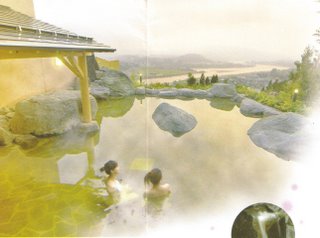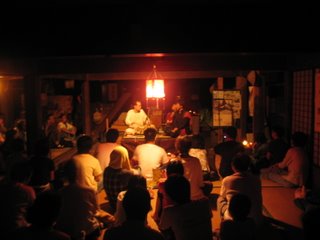
Hi folks,
I wanted to write all about my trip to Japan in living colour detail, all about the onsens (see pic above), delicious cold soba and amazingly fresh sushi. But back in Brisbane now, I'm too rushed off my feet with work Monday to Friday and organising the December tour of bansuri player Taro Terahara.
So I'm just going to have to post this article I recently wrote for the BEMAC (Brisbane Multicultural Arts Centre) Newsletter - "Postcard from Japan".
Postcard from Japan - Shen Flindell
"I'm going to Japan for a few months."
"Oh really, are you going to teach English?"
"Nooooo, I'm going to play Indian classical music."
"Oh really...?"
Back in June and July I had this conversation quite a number of times. I wonder why people are always so surprised to hear that Indian classical music and dance are thriving in Japan. When one thinks of traditional Japanese culture, what comes to mind? Elegance, stillness, attention to beauty and detail, respect for tradition, pursuit of excellence, appreciation of nature and deeply felt emotion. All very suited to the practise of Indian classical music. There are quite a few artists who have been practising Indian classical music and dance continously and devotedly for 15-20 or more years, and in recent years there has been an explosion of popularity among young people who travel to India every year.
Indian classical music (ICM), with its' balance of tradition and spontaneity, its' vast repertoire of ragas and talas within a relatively simple improvisational framework, offers, I believe, the widest opportunities for the expression of the artist's sentiment and character. Even presented with 2 musicians who have learnt from the same guru, playing the same raga, one will inevitably find that each musician's style shines distinctively. ICM is a precious jewel in not just India's, but the world's cultural heritage. And just as western classical music, jazz and popular music have so successfully spread around the world that no one blinks an eyelid at a Chinese classical pianist or a Danish jazz musician, I feel sure the time is coming when ICM will also blossom worldwide, as it is currently starting to do in a few places outside India such as San Francisco, London and Japan.
Several years ago I moved to Japan for a few years, during which time I managed to meet and play with just about every experienced ICM artist in the country. With that network of friends in place, this year I was able to fill out my 10 week trip with 15 concerts with 8 musicians. Here's a quick rundown of some of the venues:
Otoya-Kintoki ("Oto-Kin") is a dedicated world music venue in Tokyo. They have world music performances every night, and probably a quarter to a third of those are Indian classical or at least involving Indian instruments. I performed at Oto-Kin twice, firstly with sitar player Junichi Osako, secondly in a vocal duet performance with Taro Terahara (usually a bansuri player) and Taka Kurihara (usually sitar). The Oto-Kin audience often includes a good number of ICM students and performers and other regular India-goers, so there's a nice atmosphere of appreciation and knowledge of ICM.
I also performed with Taro Terahara and Taka Kurihara at the Bridgestone Museum auditorium (In our spare time we were able to go and check out the Monets, Manets, Renoirs, Picassos, etc upstairs). This was half instrumental performance, half lecture on Indian music, to a largely elderly audience.
 Between these concerts, I went with Taro Terahara to the countryside prefecture of Niigata where we played two very well-attended concerts in traditional Japanese farmhouses. Taro is a leader in the ICM scene in Japan, playing absolutely lovely bansuri (bamboo flute) and combining an extensive knowledge of ragas and compositions with an excellent improvisational ability and sense of beauty and mood. He has recently made 2 CDs with top Indian tabla player Anindo Chatterjee and will be coming to the Brisbane region in December for a concert tour with yours truly (see below).
Between these concerts, I went with Taro Terahara to the countryside prefecture of Niigata where we played two very well-attended concerts in traditional Japanese farmhouses. Taro is a leader in the ICM scene in Japan, playing absolutely lovely bansuri (bamboo flute) and combining an extensive knowledge of ragas and compositions with an excellent improvisational ability and sense of beauty and mood. He has recently made 2 CDs with top Indian tabla player Anindo Chatterjee and will be coming to the Brisbane region in December for a concert tour with yours truly (see below).
This concluded the Tokyo-side of my tour and so I moved over to Nagoya, Kyoto (my old home) and Osaka. In Nagoya I performed with Jimi Miyashita, a close disciple of the master of santoor, Pt. Shiv Kumar Sharma, at Space-Ji, another space pretty much devoted to Indian music and dance. Nagoya is quite a centre for ICM in Japan as it is the home of sitar master Amit Roy, who has many many disciples (among them Taro Terahara).
 In Osaka I performed twice with young sitar player Tadao Ishihama, who began his studies in sitar at the age of 14. The first concert was in the 120 year old Salon de Amanto, the second an interesting concert at an art gallery attached to a community health center - once again this concert brought a largely elderly audience who were absolutely enthralled.
In Osaka I performed twice with young sitar player Tadao Ishihama, who began his studies in sitar at the age of 14. The first concert was in the 120 year old Salon de Amanto, the second an interesting concert at an art gallery attached to a community health center - once again this concert brought a largely elderly audience who were absolutely enthralled.Then Kyoto, the home of the spirit of Japanese culture. I played here with Jimi Miyashita in the beautiful Ei-Un-In temple. Having lived in Kyoto previously I've had a few opportunities to play in Ei-Un-In and some other temples, and I can tell you that Japanese temples are just about the best possible venue for ICM. In a tatami-floored room charged with centuries of meditation, with an exquisite Japanese garden of moss-covered rocks and lichen-encrusted trees as our backdrop, and the typically respectful Kyoto audience, this was an amazing experience. Jimi-san's alap in Raga Puriya Kalyan moved me to tears.
I also had a chance to play in the countryside town of Ayabe in north Kyoto, in a 193 year old house, once again loaded with atmosphere. Countryside ICM concerts in Japan have always proved to be very successful, bringing large audiences of often elderly people who generally have never heard Indian music before and who invariably leave very taken away by the whole experience.
Finally, following a small concert with Koki Yoshida in Nagoya's Garuva restaurant (which has spawned copies around the world including Brisbane), there was the all-night Sangeet Mela in countryside Gifu. This wonderful event is now in it's 9th year, organised by Jimi Miyashita and featuring musicians and dancers from around the country plus a few guests from India. It draws about 100 people who travel anything from 4 to 15 hours to get there and there is a genuine feeling of family and community among the participants. It's so special to be in the green room with so many great musicians, everyone with their own style and mood. This year's Mela featured 4 sitar players, 4 tabla players, bansuri, santoor, Dhrupad vocal, pakhawaj, violin as well as Kathak, Odissi and Bharat Natyam dance. I accompanied Tadao Ishihama (sitar) and Carlos Guerra (bansuri - yes that's right, an Australian and a Spaniard playing Indian music in Japan) - very nice for me as these two musicians have such diverse styles that I was able to show two very different sides of my own playing. The highlights for me were young sitar player Gopal Krishna Shah (who I realised I had practised with in Rishikesh 6 years ago) and Odissi dancer Sachiko Murakami, one of the most engaging and moving dancers I've ever witnessed.
Some interesting points:
: In 10 weeks I played 15 concerts with 8 musicians and practised with another 8, altogether covering every major Indian classical instrument;
: By playing with such a range of musicians, I learnt a great deal and expanded my own musical scope;
: Country concerts were particularly successful - something to note for Australia?;
: In many concerts, 50-80% of the audience were hearing ICM for the first time, with very positive responses;
: Elderly audiences were especially appreciative;
: Australia, with it's big spaces, tends to aim for large audiences to make budgets work, but in Japan I've found that ICM concerts (2 musicians) in small spaces can be just as financially lucrative, with less risk and more personal and therefore more absorbing atmosphere;
: Japanese ICM performers practise a lot, and visit India every year for further training and immersion, and so play with a lot of intensity, devotion, technical capability, improvisation and diverse repertoire - Could ICM performers in Australia please take note?
Taro Terahara & Shen Flindell's Tour Schedule
Fri 8 Dec: Toowoomba
Sat 9 Dec morning: Ipswich
Sat 9 Dec evening: Gold Coast
Sun 10 Dec: Ewingsdale (Byron Bay)
Thu 14 Dec: Maleny
Fri 15 Dec: Maroochydore
Sat 16 Dec: Brisbane
For full up-to-date info, please check ethnosuperlounge.blogspot.com or visit ethnosuperlounge.com and click on Events
Shen can be contacted by phone on 0415-106428 or by email at shen@ethnosuperlounge.com







No comments:
Post a Comment